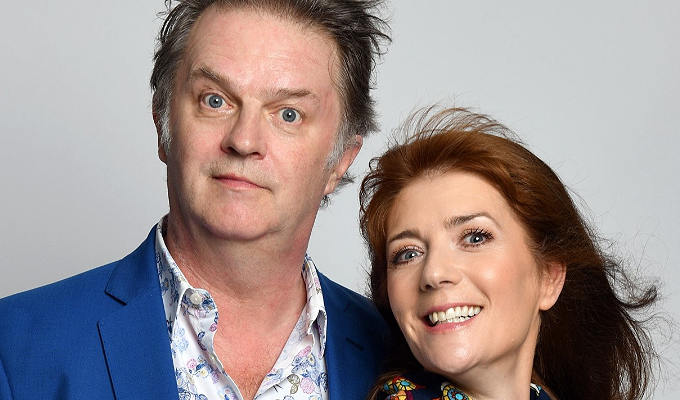
Changing times...
As he stands down as comedy editor of Time Out, Malcolm Hay reflects on 20 years of stand-up
The thing I most noticed since I started working for Time Out, is that London's comedy scene has got bigger. Much bigger. The magazine’s comedy section is about five times larger than it was when I started in 1986 and that’s a reflection of the growth there’s been. More clubs, more comics, more courses for people who want to become comedians. That’s in London, of course, but it’s true of elsewhere in the country.The expansion has been quite amazing. In the Nineties you’d often hear comedy promoters and managers muttering dire warnings about how the bubble was bound to burst – it was all going so well, audiences were piling in, but after so many years of growth it was too much to hope it would continue.
But the dip never happened.
In London, there’s quite a rapid turnover. Clubs come and go. But as soon as one disappears, another will be there to replace it. Real credit goes to the clubs that survive five years, or ten, or more.
In 1986, in the first listings I put into Time Out, the Comedy Store was there, of course. So was Jongleurs in Battersea, although none of the other London Jongleurs clubs existed then. What else? Banana Cabaret at the Bedford in Balham, Downstairs at the King’s Head in Crouch End, the Chuckle Club (except it was at the Black Horse in Rathbone Place then). Those are the promoters who paved the way in the early days and who still represent the idealistic side of the business – blokes like Pete Grahame at the King’s Head and Paul Jay, who’s persisted with the Chuckle Club even though he’s had to switch venues around ten times.
It’s been suggested that nowadays there’s less experiment in comedy. That comedy is less exciting. That’s rubbish. Just some kind of crazy nostalgia. Look at the innovative newer comedians who’ve come through quite recently: like Robin Ince, Mark Watson, Josie Long, Andrew Lawrence, Andrew O’Neill. That’s off the top of my head – there are many others. There’s no lack of invention.
At the same time, there’s always a large number of comedians who are quite skilful, and amusing enough, who’ll give quite good value but never excite you. They’re needed. There’s a place for them because, in any field, we can’t all be geniuses.
There’s a need for big, commercially minded venues as well as clubs which will put on the oddballs who could be leading comedians in the future. There’s a need for all sorts of comedians. And the striking thing is that comedy, which is a major form of entertainment as well as being, at its best, an art form too, has survived and thrived more or less without any kind of subsidy. It’s done it without any help. Because people want it, so they’ll come out and pay to see it.
Getting a place right as a room for comedy is a difficult thing. But the worst, and most cynical, examples of bunging comedians into totally unsuitable spaces happens with sickening regularity each year at the Edinburgh Fringe. So many lousy spaces, lousy for the performers and near intolerable for audiences. Airless holes where I’m sure, one year, a member of the audience will die purely because of the conditions. It’s probably happened already, but the news has been suppressed.
I also have a strong aversion to shows where there’s an interval between each act. The night can never develop any rhythm or momentum. I think they should be banned.
The best comics? So many. That’s not being coy, there are genuinely are so many. But you can’t be hanging around the business for this long without having strong memories. Like seeing Lee Evans in the very early days working his socks off at the King’s Head to a fairly small audience and looking, even then, like a star, or Eddie Izzard winging it, when he’d just started out, at one of Pete Harris’s Screaming Blue Murder clubs. Or mad bastards like the Iceman, whose act consisted of melting a big block of ice. Well, trying to. There was never time to get the job done.
Worst comics? Hell, it wouldn’t be right to start naming names. I’ll say this. I love comedy that’s silly, comedy that’s surreal, comedy that’s serious (yes, it can be serious and funny), that’s challenging, that’s offensive, and even comedy that’s observational in a limited and restrained way, that tells us what we already know about the minor things in our lives, as long as it’s not just comfortable and cosy and self-satisfied. I don’t think it’s comedy’s job to leave you feeling comfortable, like you’ve just spent an hour or two lying in a warm bath. That’s why I can’t stand Peter Kay. He’s good at what he does. But do we really need anyone to do it?
It’s also astounding there are still a few comedians who’ll ask someone in the audience where they’re from and not be doing it as a joke! They know who they are. They should be shot.
The one thing I’d change in comedy is that TV producers, and independent companies, aren’t prepared, most of the time, to be courageous, and back their own hunches, and give unknown comedians a chance to make what they want to make, without having them go through 79 meetings and then get so badly interfered with they don’t feel much like doing anything anymore.
Now I’m leaving Time Out, my main aim is, together with my wife, to find the time to write some comedy of our own. It’ll probably be conclusive proof that I never understood much about comedy in the first place…
- A 'thank-you' benefit, Comedy Hayday, will be staged in Malcolm's honour at the Hackney Empire on Tuesday July 17.
Published: 29 May 2007






